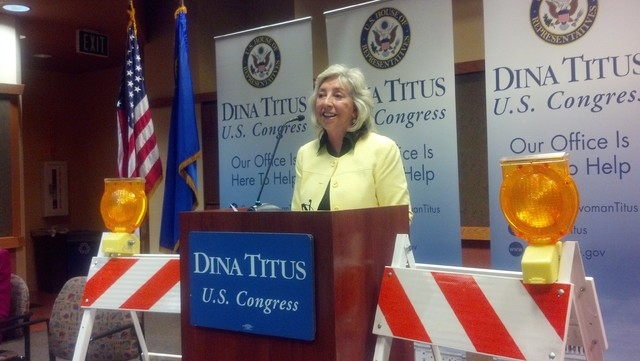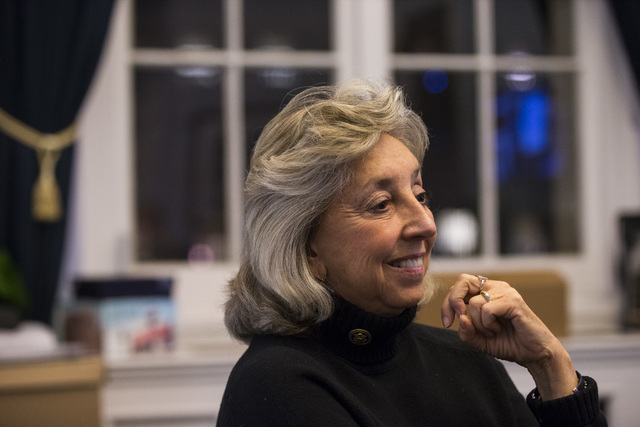Titus proposes to reroute some U.S. transportation funds to local groups


A portion of federal transportation funding would be detoured to a grant program administered by representatives of local community organizations under legislation introduced by Rep. Dina Titus.
Titus, D-Nev., gave details of her Innovation in Surface Transportation Act in an announcement Monday at Regional Transportation Commission offices.
The legislation is designed to put some transportation funding decisions in the hands of local government leaders and community organizations like chambers of commerce, travel and tourism boards, transit agencies, labor unions and other public interest groups.
“It’s intended to empower state stakeholders who are impacted by state transportation investment decisions, but who aren’t at the table right now,” she said.
No additional taxes or fees are written into the bill. Funds for the grant program would come from a reapportionment of existing transportation funds directed to each state.
Under existing funding formulas and allocations, $54 million would be directed to the grant fund this year.
The legislation is co-sponsored by Rep. Rodney Davis, R-Ill., who serves with Titus on the House Transportation and Infrastructure Committee.
At Monday’s announcement, Kristin McMillan, president and CEO of the Las Vegas Metro Chamber of Commerce, Clark County Commissioner Chris Giunchigliani and Las Vegas Councilman Steve Ross endorsed the proposal.
The local officials see the bill as an opportunity to win federal funding for significant street, transit and air quality projects at a time when there’s greater competition for dwindling transportation resources.
Titus said the proposal is in response to growth occurring in the nation’s urban areas and the need for additional transportation resources to serve that growing population. She said 85 percent of the nation’s population now lives in cities and demand is growing for funds for alternative transportation methods, from bicycles to light rail systems.
“Since 2000, Las Vegas has grown by 37 percent,” Titus said. “Add on top of that our 40 million to 42 million tourists that come here and we know how important it is. We’ve got to get people here and move them around safely and efficiently once they get here. That’s what our economy is all about.”
Titus hopes the legislation eventually would be folded into a bill that would reauthorize transportation funding in the Moving Ahead for Progress in the 21st Century Act, which expires Sept. 30. Introducing the bill separately enables supporters to keep the grant fund proposal alive should the so-called MAP-21 bill get bogged down in Congress.
Currently, Nevada receives about $409 million a year from the federal government accounting for 53 percent of the money the state spends to build and maintain roads and for public transit.
More than 90 percent of the money routed to Nevada is redistributed by the Nevada Transportation Department.
Under the Titus bill, a portion of five different transportation funding accounts would be tapped to fund the new grant program.
Under a formula within the bill, 10 percent of funds directed to Nevada through the National Highway Performance Program would go to grants as well as one-third each of the amounts currently allocated for the Highway Safety Improvement Program, the Congestion Mitigation and Air Quality Improvement Program, the Surface Transportation Program and the Transportation Alternatives Program.
Titus said the amount of money allocated to the state wouldn’t change — but who decides where it goes would.
Under the proposed legislation, a statewide selection panel of up to 18 members would be appointed by the Transportation Department of each state to administer the grant fund.
Up to nine members of the panel would come from government leadership with at least three from the Transportation Department, three from local governments representing cities of varying sizes and at least three representing metropolitan or rural planning organizations.
A second group with a number of members equal to the government group would represent local chambers of commerce, transportation management organizations, travel and tourism boards, economic development organizations, local air quality boards, state safety boards, transit agencies, active transportation organizations dealing with bicyclists and pedestrians, public interest organizations, port authorities in states that have them and labor unions.
Titus said he is unaware of any organizations opposing the proposal and that she doesn’t expect rural groups to come out against it because they, too, would be eligible to apply for grants.
Contact reporter Richard N. Velotta at rvelotta@reviewjournal.com or 702-477-3893. Follow him on Twitter @RickVelotta.












